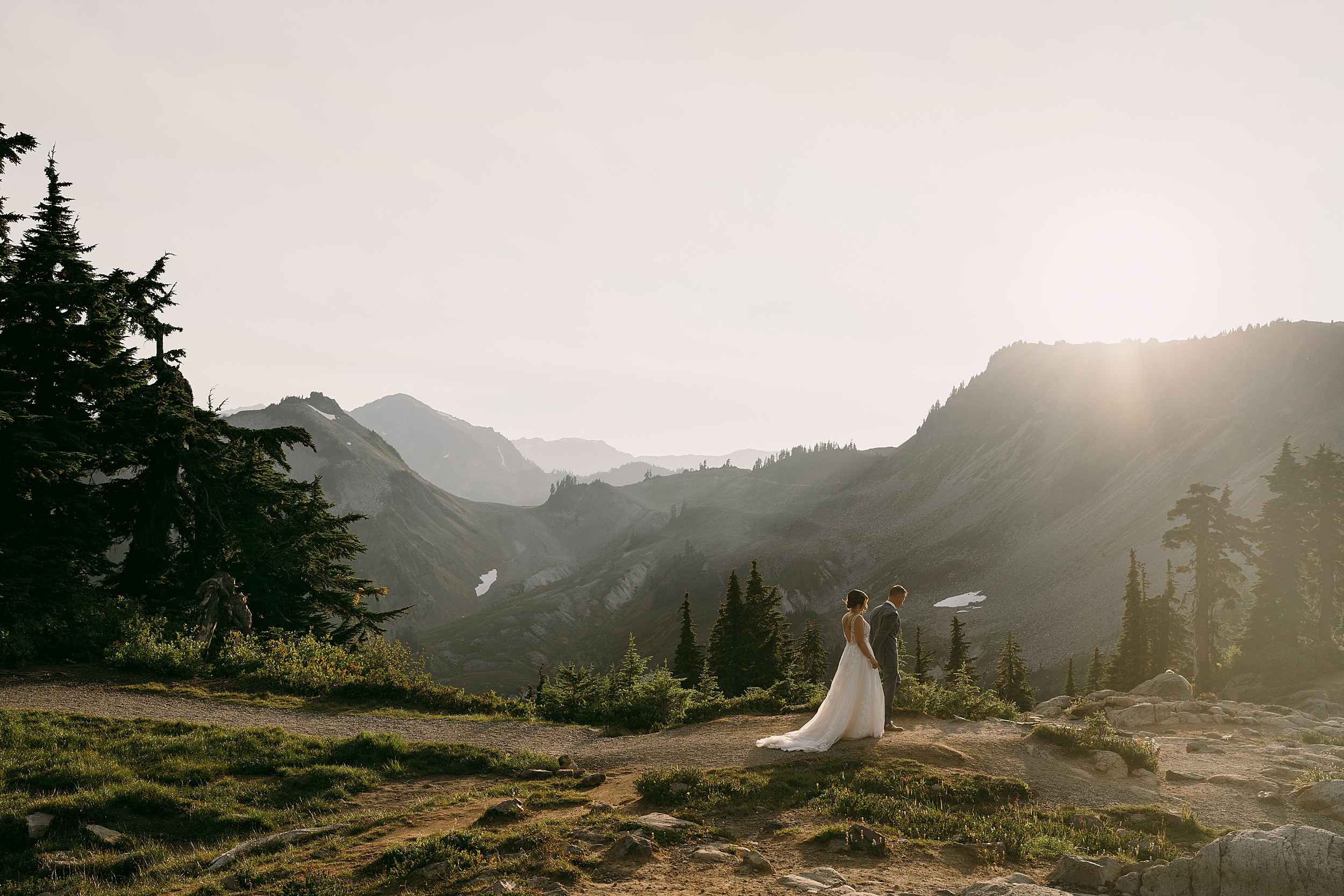
Post Summary: When you first start out as an elopement photographer, it can be so overwhelming to figure out what gear you need, and what the best options are – trust me, I know from firsthand experience. That’s why I’ve put together this guide to all of my favorite elopement photography gear, from camera bodies, to lenses, to accessories, and more. I hope this list helps give you a little bit of a headstart when it comes time to shop for new gear!
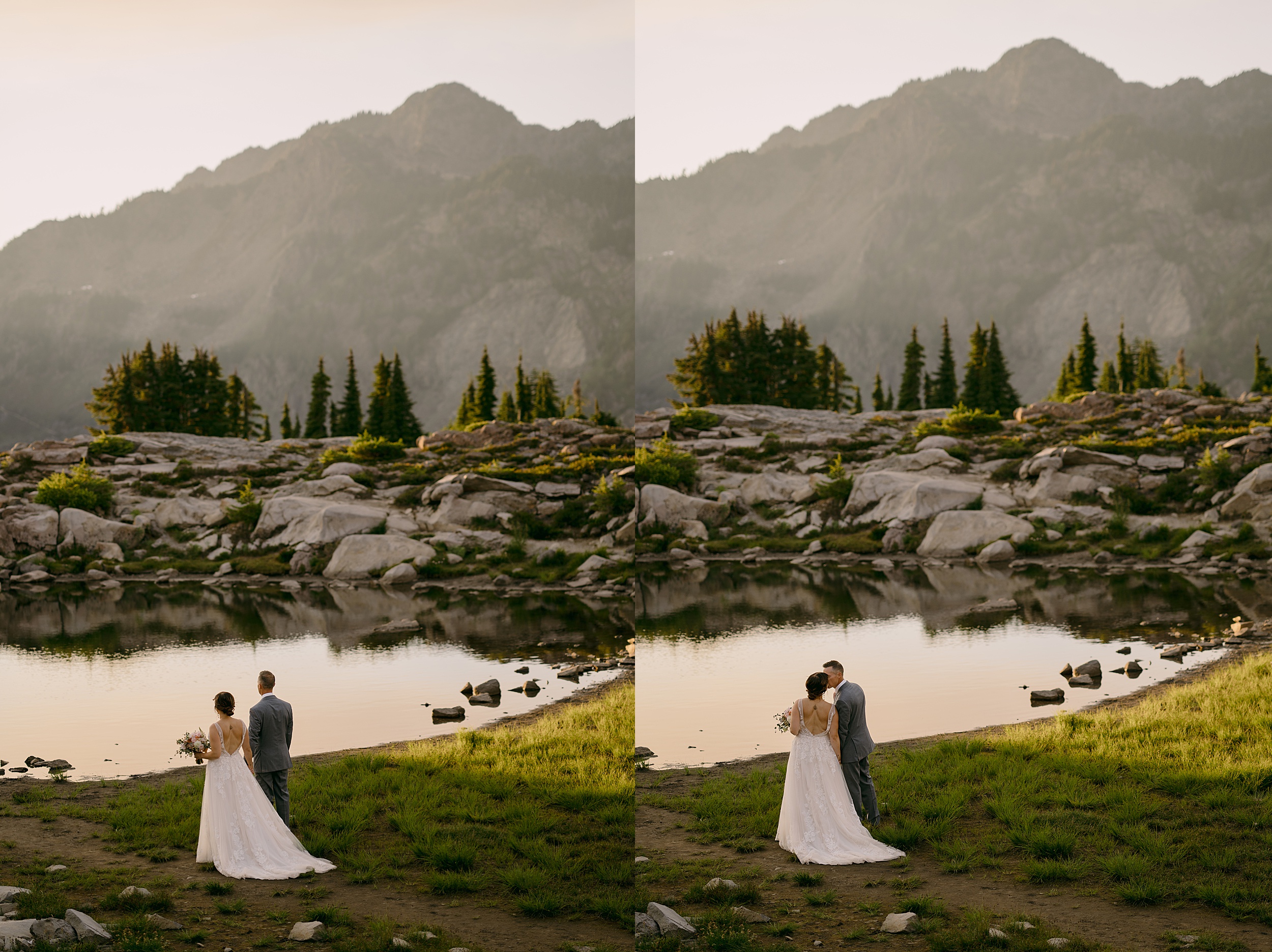
Allow me to introduce myself real quick before I start giving you all my top recommendations – hi friend, I’m Katie! I’m a Seattle-based elopement photographer with a love for all things adventure, travel, nature, and love. I’m a PNW native and am obsessed with everything about this stunning region of the United States, and am SO beyond grateful that I get to live somewhere so freaking epically beautiful. I spend a good chunk of my time out in the elements, exploring nature, even when I’m not photographing outdoor adventure elopements with awesome couples, and I’m a huge proponent of Leaving No Trace & protecting this beautiful world we live in. I’ve spent YEARS putting my heart and soul into my elopement photography business and am so proud of what I’ve created, so I’m super excited to share some tips with you to help you get started on that same journey.
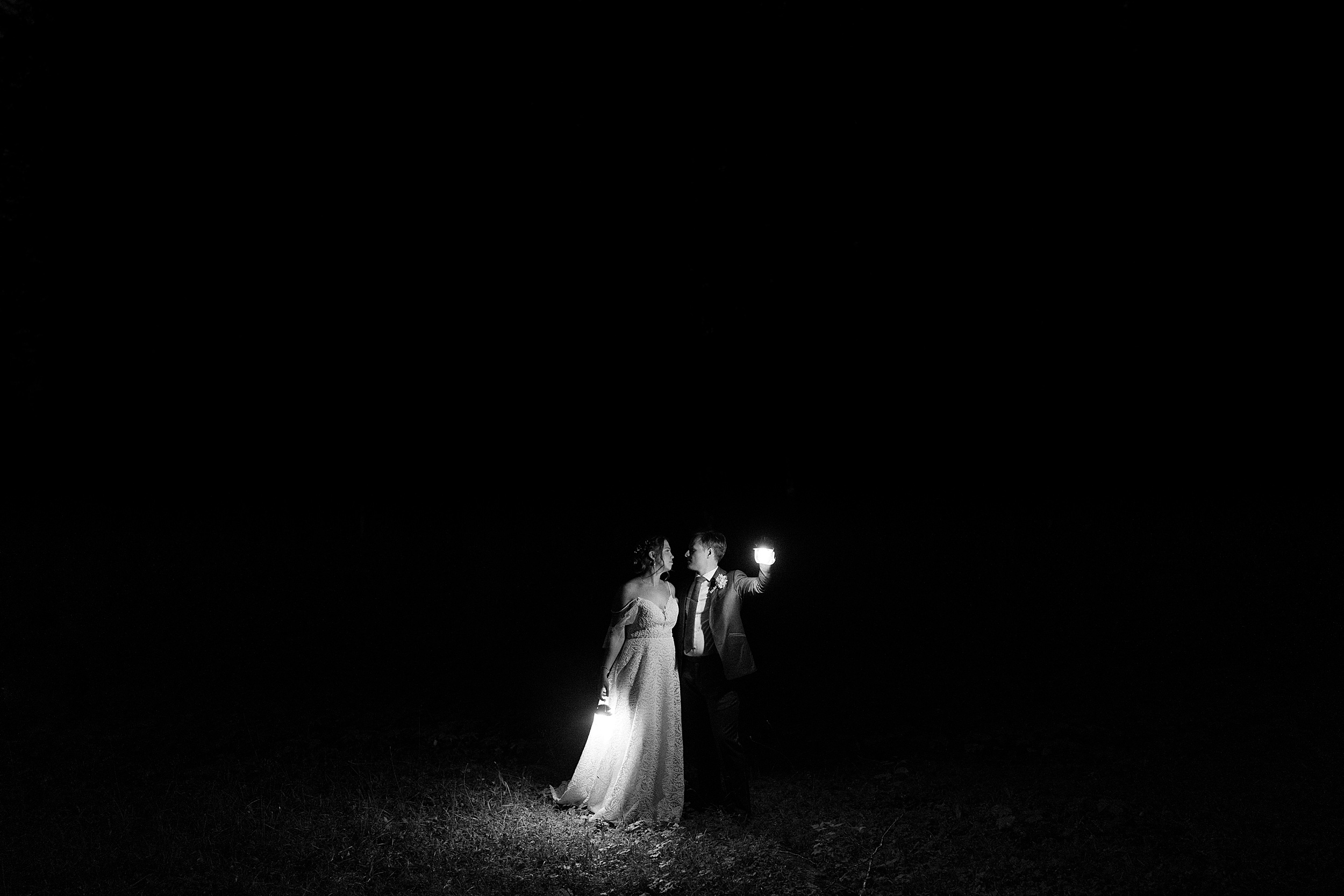
What to Look for When Choosing Elopement Photography Gear
Before we start talking about the specific gear I use and love, let’s go over a few things you should pay attention to when shopping for elopement photography gear! It can be SUPER challenging to pick the “right” gear, especially if you’re a fairly new elopement photographer – there are sooo many brands, cameras, and lenses to choose from. How are you supposed to know what’s best for you?!
But hey, it’s pretty freaking amazing how much camera gear has improved over the years, and how many amazing options there are for every level of photographer now! I swear, every new iPhone model gets one step closer to beating out the expensive DSLR’s on the market.
And that brings me to an important question that I wanted to answer before we get too deep into this:
Are DSLR or mirrorless cameras better for elopement photography?
If you’re a total beginner, you might not know the difference between DSLR & mirrorless when it comes to cameras – so real quick, let’s talk about how they compare!
Here are some of the major differences between DSLR’s and mirrorless cameras that you should know as an elopement photographer:
- DSLR’s use a mirror to reflect an optical image into the viewfinder, whereas mirrorless cameras have no mirror (hence the name!) and instead, create an electronic image in the viewfinder/on the screen by using the live view captured by your camera sensor. This means that, with DSLR’s, you’re looking at the composition of the picture in your viewfinder, and when you change your settings, you won’t see the changes reflected in the viewfinder. But with mirrorless cameras, if you, say, bump up your ISO, that change will be reflected in the image you see – a.k.a. you’ll see your image get brighter! I personally LOVE this part of using mirrorless cameras, because I can more accurately see the image I’m composing.
- DSLR’s use two autofocus sensors, while mirrorless cameras use a single autofocus system. This enables mirrorless cameras to have a lot better frame coverage and focus tracking!
- Mirrorless cameras are typically a lot less bulky than DSLR’s, and with those smaller bodies come smaller buttons/controls.
- DSLR’s typically have longer battery life than mirrorless cameras.
- Mirrorless cameras are often pricier than DSLR’s, so they may not be the best option if you’re just starting out and have a lower budget.
- Without a mirror, mirrorless cameras are often better at image stabilization.
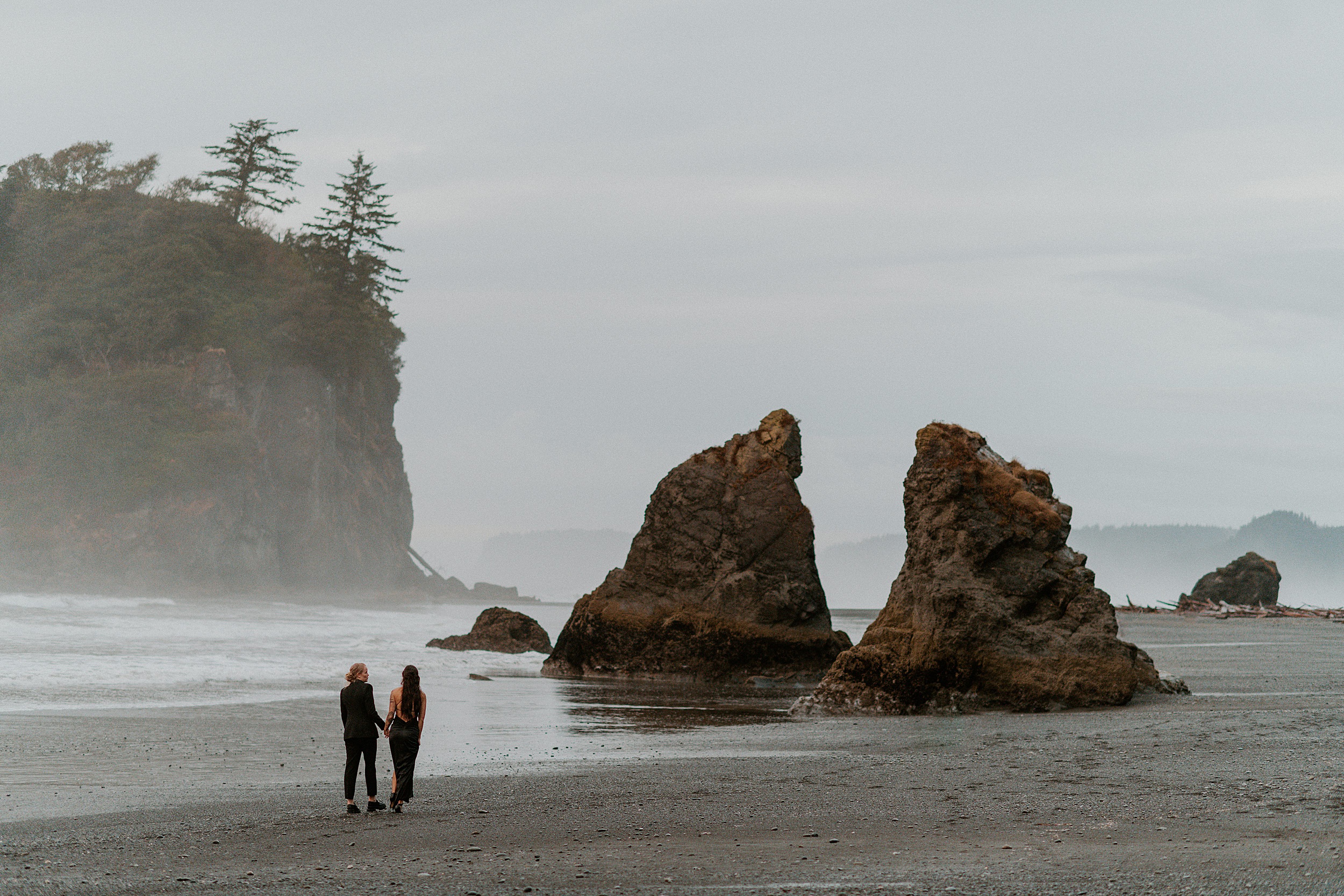
Once you’ve decided between DSLR & mirrorless, here are the main things you’ll want to look for when choosing your elopement photography gear:
1. Weight
It’s SUPER important to choose gear that’s lightweight as an elopement photographer, since you’ll be carrying your gear around for long periods of time. I carry 2-3 bodies on me at all times, as well as a variety of lenses, accessories, batteries, etc. This is one of the best parts about mirrorless cameras – the bodies are a lot lighter and more compact, which is great when you need to carry around multiple at once! Along with considering the weight of the body you buy, make sure it’s also comfortable & ergonomic to carry and use. You’ll be carrying your cameras around for a WHILE on elopement days, so you don’t want to be using a camera that’s super heavy or difficult to grip!
2. Quality
You obviously want to choose a camera that’s going to be high quality, both in its images and the body itself. Make sure that your camera body is sturdy, and that the camera is compatible with high-quality lenses. Cameras will usually come with one or two kit lenses, which are good lenses to start with for beginner photographers, but you’ll want to invest in better lenses that offer higher image quality and better-quality zoom capabilities! The quality of your images depends not only on the lens you use, but also the size of the sensor on your camera. You’ll want to look at the amount of megapixels your camera sensor offers, because that affects how much detail your camera sensor can capture. A higher amount of megapixels doesn’t necessarily mean a higher-quality image, but it does mean that you’ll be able to crop & enlarge an image without as much of a reduction in quality!
3. Focus
Next, you want to make sure your camera can focus quickly & accurately. The more focus points your camera has, the more accurate its focus will be, and the better the focus tracking capabilities, the less you’ll have to work to get your subjects in focus. The top-notch autofocus & tracking of Sony mirrorless cameras is a huge reason why they’re my favorite to use for elopement photography – but more on that a little later!
4. Weather resistance
This one is SUPER important no matter where you live, because the last thing you want is for your camera gear to be ruined due to weather! Just like your couples, you need to be prepared for anything, and your camera gear can definitely be affected by things like rain, moisture, precipitation, extreme heat, extreme cold, snow, etc. Make sure to buy camera gear that can stand up to any type of weather, from snow to rain to strong winds. Look for cameras that have weather sealing to provide extra protection against precipitation, moisture, or objects getting into your camera, as well as against extreme temperatures.
5. Reliability
You’ll be using your camera gear a LOT, obviously, so make sure you buy gear that’s reliable and trustworthy! A big part of this is buying from reliable brands on the market, such as Canon, Sony, Nikon, or Fuji, and doing proper research before you buy anything. You can look at reliability reports from customers through websites like Consumer Reports, browse through product reviews, and pay attention to the sturdiness/quality of the materials that cameras & lenses are made of. I do recommend purchasing new gear versus used if your budget allows, to make sure you can get the most out of your gear and can trust that it doesn’t have any previous issues!
6. Low-light capabilities
Finally, and this is a big one, buy gear that has excellent low-light capabilities! You won’t always be shooting elopements in bright daylight – you’re going to be shooting at blue hour, in the dark, inside rooms without much natural light, under twinkle lights in backyards, etc. You simply can’t rely on natural light as an elopement photographer, so it’s crucial that your gear is able to capture high-quality images in low light. A lot of older cameras produce images that are crazyyyy grainy once you bump your ISO above 1000, and that’s just not an option when couples are hiring you to document their special day! Yes, you can smooth out some noise when you edit, but the more you can reduce noise in-camera when shooting in low light, the better.
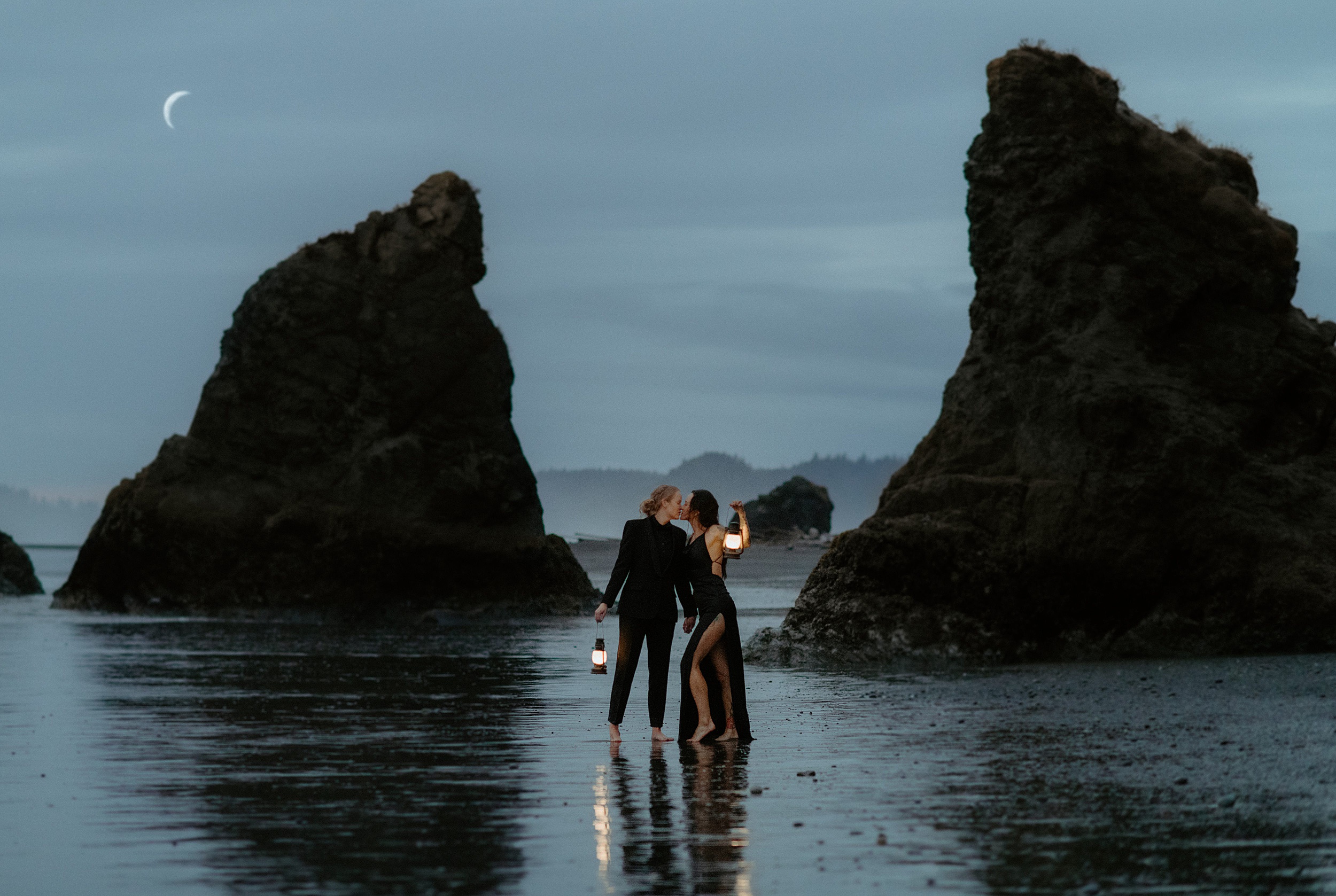
Best Cameras for Elopement Photography
Now that you know what to look for when choosing your elopement photography gear, let’s dive into all of my top gear recommendations for elopement photographers, from camera bodies, to lenses, to drones and more!
We’ll start off with the main course: camera bodies.
What is the best camera for elopement photography?
Sony A7iv
While there are a ton of fantastic cameras out there that will work great for elopement photography, my personal opinion is that Sony Alpha mirrorless cameras are the best cameras for elopement photography. I use and love the Sony A7iv, which is a 33-megapixel, full-frame, mirrorless camera with some of the BEST AI-powered autofocus tracking on the market. The low-light capabilities are excellent, and the “Eye-AF” technology is incredible at tracking subjects for super quick, accurate focusing! I can’t recommend it enough for elopement photographers 🙌
Aside from my main camera bodies, here are a few other cameras I like to carry around with me for elopements:
Fujifilm Instax Mini EVO Instant Camera
I adore my Instax Mini EVO for taking polaroid photos of my couples! It’s so special to have something for them to take home at the end of the day & to last until they get their sneak peeks.
Fujifilm X100F
This is the compact camera I take with me when I travel, for when I don’t feel like pulling out my full camera bodies!
Olympus Stylus Epic Zoom 170 35mm
The Olympus is my film camera that I carry around in my bag, with a fantastic 38-170mm zoom lens & a super compact, weather-durable body.
iPhone 14 Pro Max
Last is my iPhone, of course! Having a phone with such a great camera is awesome for daily content & BTS videos on elopement days.
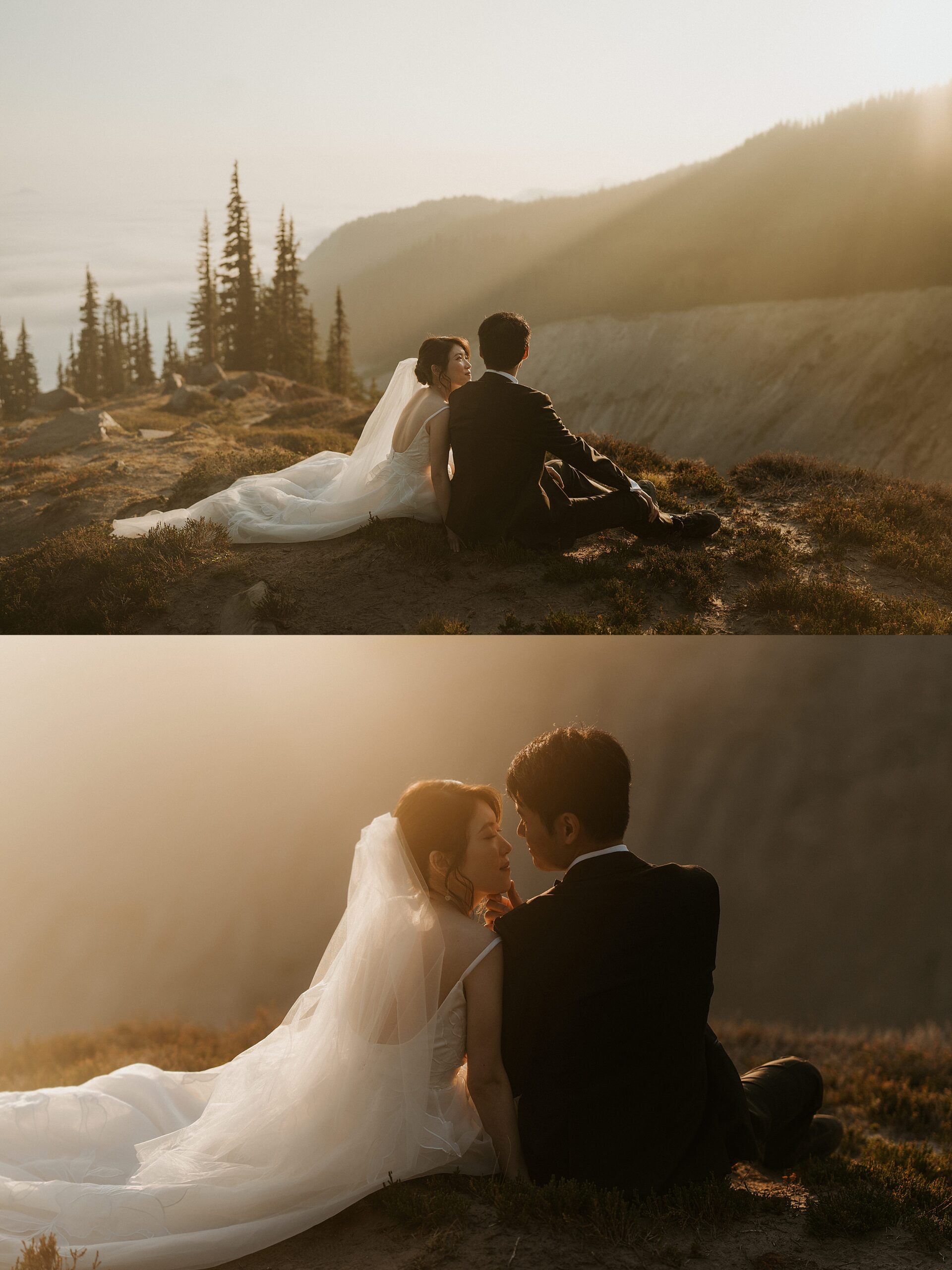
Best Sony Lenses for Elopement Photography
Moving onto lenses! While choosing a high-quality camera body is incredibly important, choosing high-quality lenses is JUST as crucial (if not more). Your lenses are what will change how your photos look & the way you’re able to compose certain shots, so it’s really important to have a variety to choose from depending on the scenario. You definitely do not want to be limited to an 85mm lens if you’re in a tight space, or stuck with a wide 24mm lens if you’re trying to capture detail shots 😅I use 4 different prime lenses and 1 zoom lens on a regular basis.
Here’s a list of the Sony lenses I carry around with me for every elopement, and what I use them for (all part of the Sony G Master series):
Sony FE 24mm 1.4 G Master
The 24mm is the best lens for taking photos in tight spaces, such as while a couple is getting ready, or if they’re having dinner in a small room at an Airbnb!
Sony FE 35mm 1.4 G Master
This is my most used lens, because it’s super versatile! I can use it for portraits, landscape shots, during ceremonies – pretty much at any point in an elopement day.
Sony FE 50mm 1.2 G Master
The 50mm 1.2 is an amazing lens for portraits, with a very shallow depth of field & the ability to produce dreamy bokeh behind your couple.
Sony FE 85mm 1.4 G Master
The 85mm is my favorite lens to use for sunsets, thanks to the way it can maintain both explore & depth of field and really capture both the gorgeous light of sunset and the couple!
Sony 70-200mm 2.8 G Master II
The 70-200mm is by FAR the heaviest lens in my bag, but it’s worth it for the epic landscape shots it produces & the wide variety of options it gives you with the zoom range!
See why having a compact, lightweight camera body is so important? Not only will you be carrying around 2-3 bodies, but you’ll also usually have 3-4 lenses with you.
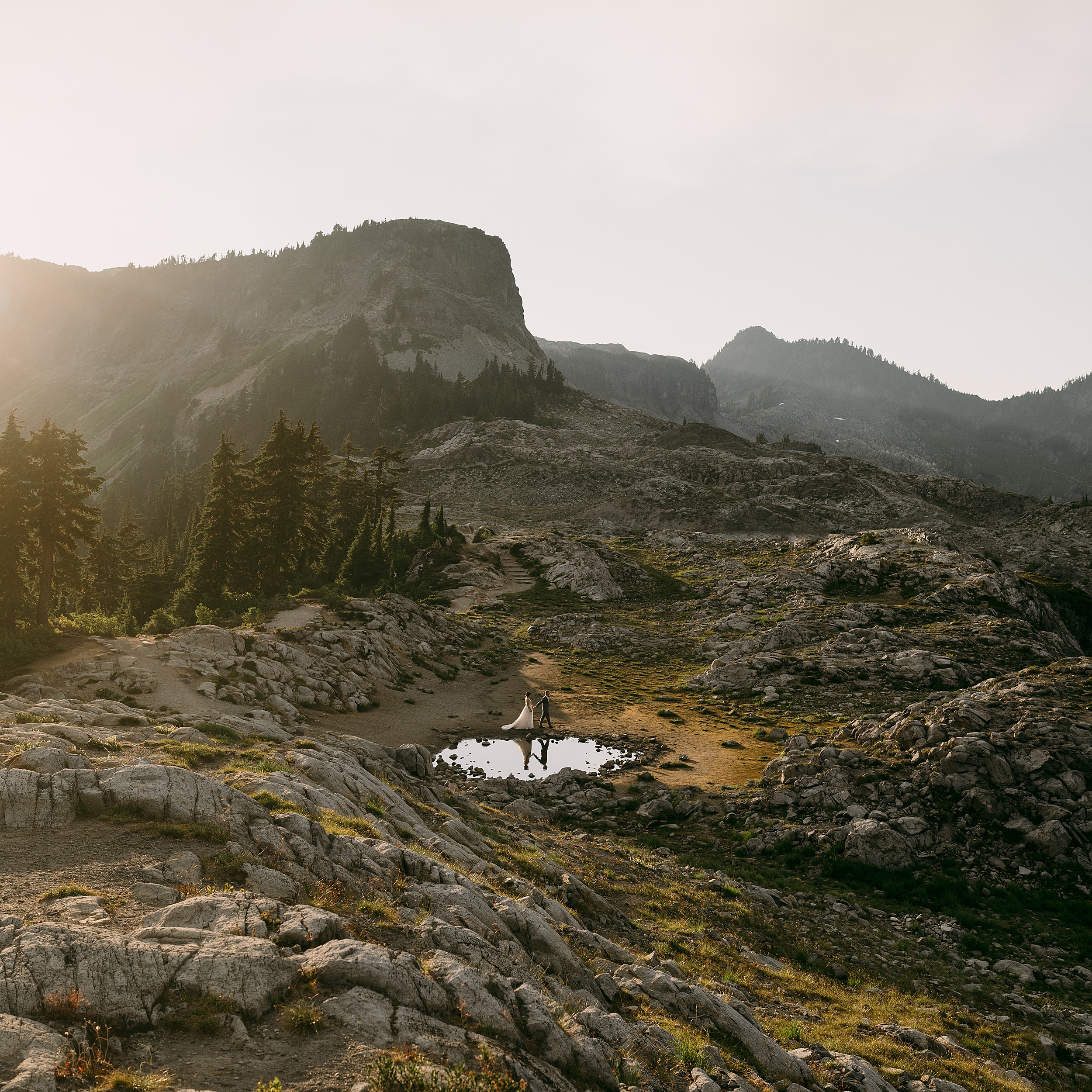
Best Drones for Elopement Photography
Next up, let’s talk drones! I have absolutely LOVED incorporating drone photography into my elopements, and my couples have freaking loved it as well – there’s just something so epic and unique about the perspective that drones can capture, and drone shots create a ton of variety in an elopement gallery.
Here are the two drones I’d recommend for elopement photographers:
DJI Mavic 3 Pro Fly More Combo
The DJI Mavic is a phenomenal drone in all ways, and can create some seriously epic photos especially if your couple is eloping in a dramatic landscape. THis combo comes with the triple-camera drone, batteries, a charging hub, and more – basically everything you need to get started with drone photography!
DJI Mini 3 Fly More Combo
If your drone budget isn’t quite as high, but you still want a high-quality drone to use during elopements, the Mini is a fantastic (and much cheaper) alternative.
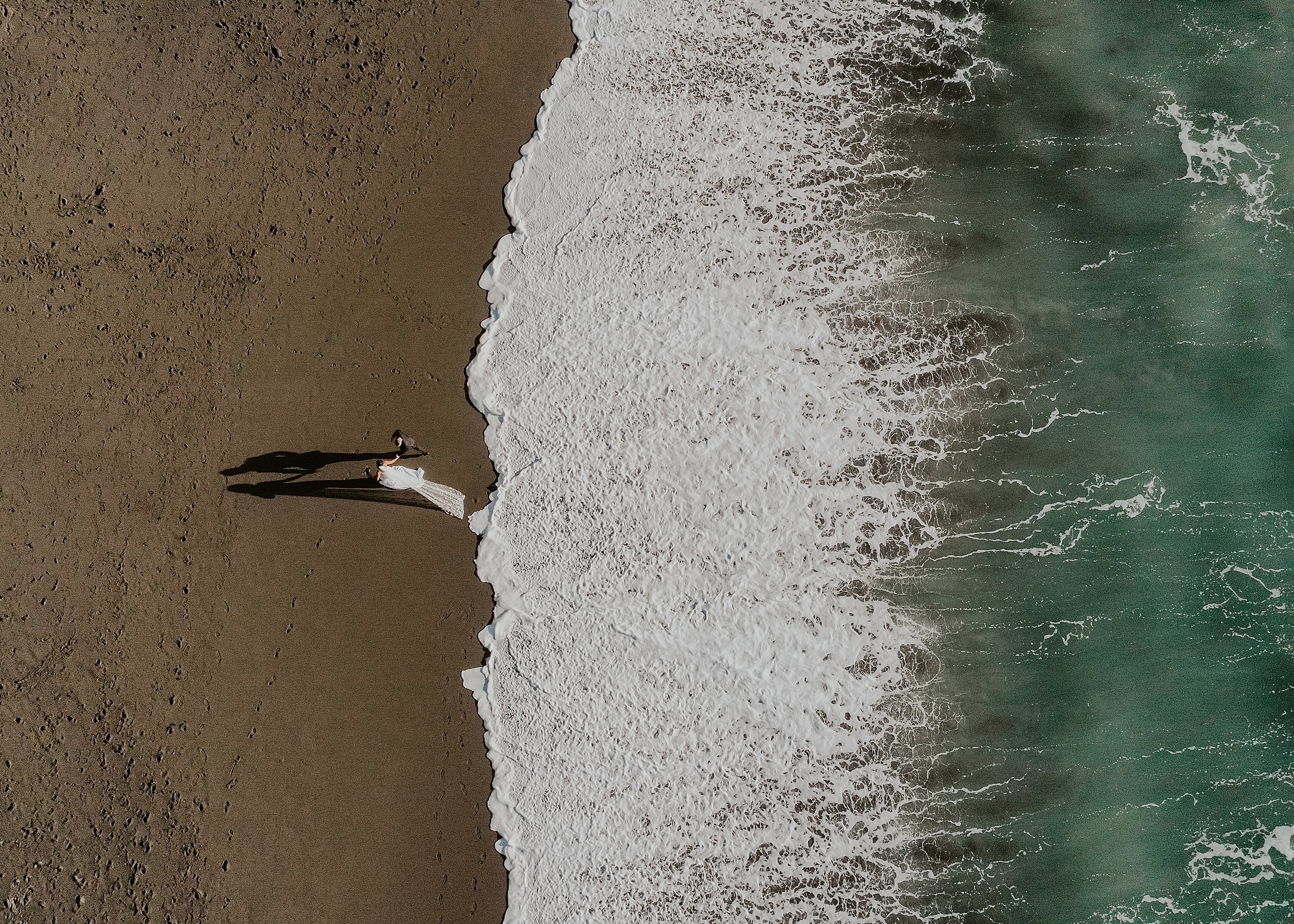
Best Camera Bag for Elopement Photography
This is probably one of the most common topics I see discussed among elopement photographers: what’s the best camera bag for elopement photography?!
I’ve gone through a TON of different bags throughout my time as an elopement photographer, and honestly, there are so many good ones out there. It really depends on how much gear you’ll be carrying around, what’s most comfortable for your body, and what your budget is.
After trying out lots of different camera bags, here are the two favorites I’ve landed on:
For hiking: Wandrd Fernweh Backpacking Bag
Wandrd is a crazy popular brand when it comes to backpacking bags & camera bags, so it’s no surprise that my all-time favorite bag is from them! The Fernweh Backpacking Bag is an incredible bag for hiking elopements, with 4 different access points, tons of adjustment options, a breathable foam back, weather-resistant material, and so much more. 10/10 recommend for any elopement photographer who shoots outdoors!
For travel: Ona The Prince Street Messenger Bag
My go-to camera bag for travel is the Ona The Prince Street Messenger Bag in Antique Cognac. It’s made of high-quality Italian leather and comes with side weather flaps to protect your gear, multiple pockets, and room for 1 camera body and 1-2 lenses. It’s perfect if you want to travel a little lighter and don’t need all of your gear!
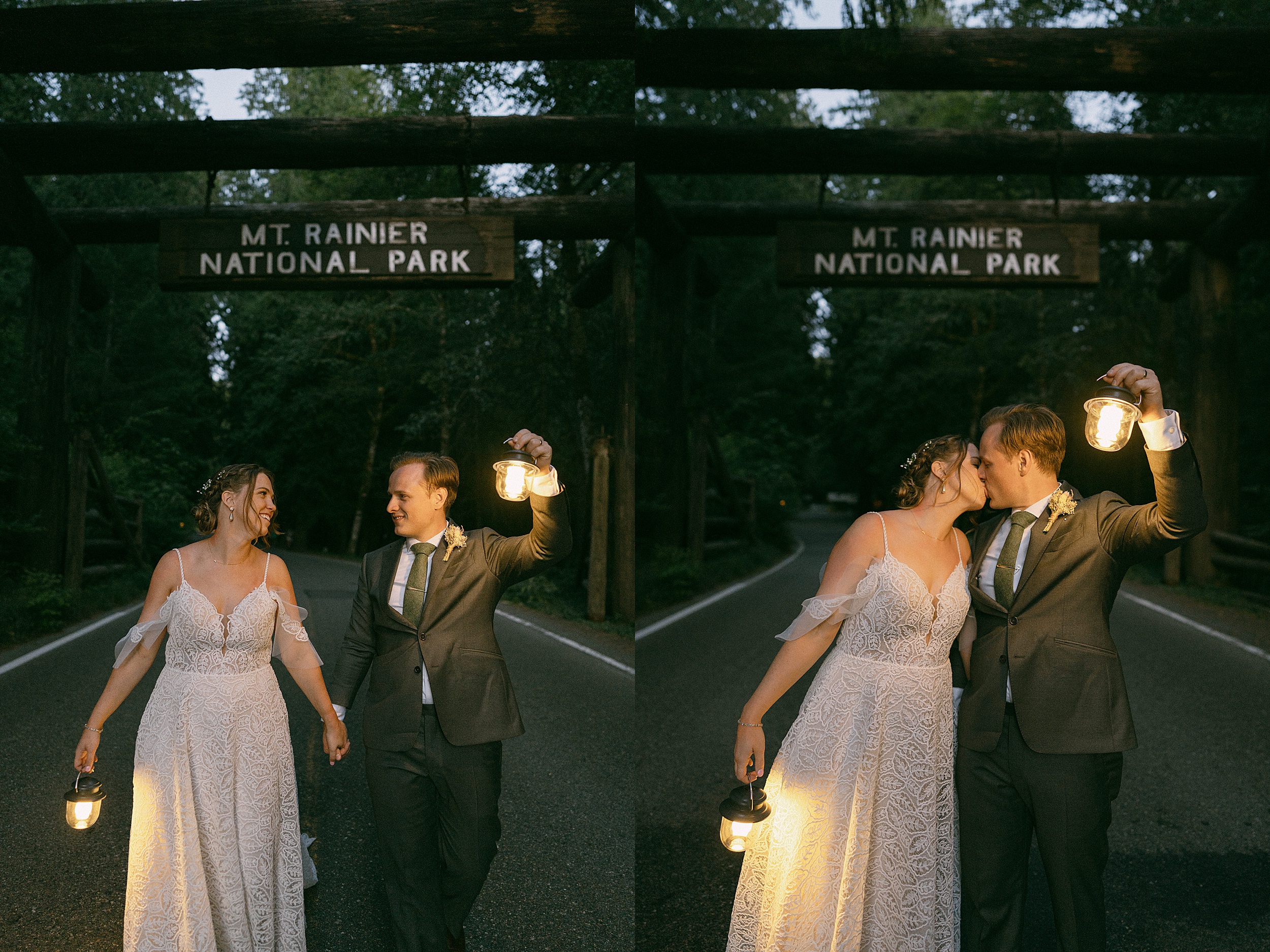
Best Camera Accessories for Elopement Photography
Having the right accessories is key to making the most out of your camera gear, and being as prepared as possible as an elopement photographer. In addition to my camera bodies and lenses, here are all of the camera accessories I carry with me in my backpack!
Tripod: ProMaster XC-M 525K Professional Tripod Kit
SD cards: Lexar PRofessional 1667x 128GB 250MB/s
These SD cards are super fast, high-quality, and reliable!
SD card case: Beeway Tough Memory Card Holder
Especially when you’re traveling and shooting outdoors, it’s crucial that you protect your SD cards properly so that there’s no risk of anything happening to your images!
Traveling case: Pelican 1040 Micro Case
I love this case for protecting SD cards and SSD drives when I’m traveling.
SSD portable external drives: G-Technology 1TB G-Drive Mobile SSD Storage
The only SSD drives I will EVER use.
Flash: Godox VING V860IIIS TTL Li-Ion Flash Kit
This is the most affordable flash for Sony cameras, and it works beautifully! You don’t need anything more expensive/fancy.
Harness: Rose Anvil Bandit Pro Package
I’m convinced that this is the BEST camera harness out there for elopement photographers. I have it in dark brown!
Lens filters: ProMaster
ProMaster is the only brand I buy from when it comes to lens filters.
Lanterns: LED Vintage Lantern
These are the lanterns I use in all of my nighttime elopement photos!
Portable speaker: JBL Clip 3
My go-to speaker – it’s lightweight and easy to clip onto your backpack, harness, or belt loop.
Headlamps: GearLight 2Pack LED Headlamp
Highly recommend using these headlamps when you’re hiking with your couple in the dark – and they make for great accessories to add a little more light to stargazing photos!
Video lights: Aputure Amaran MC RGBWW
I love using these video lights to bring in a little more light when my flash just isn’t doing the trick.
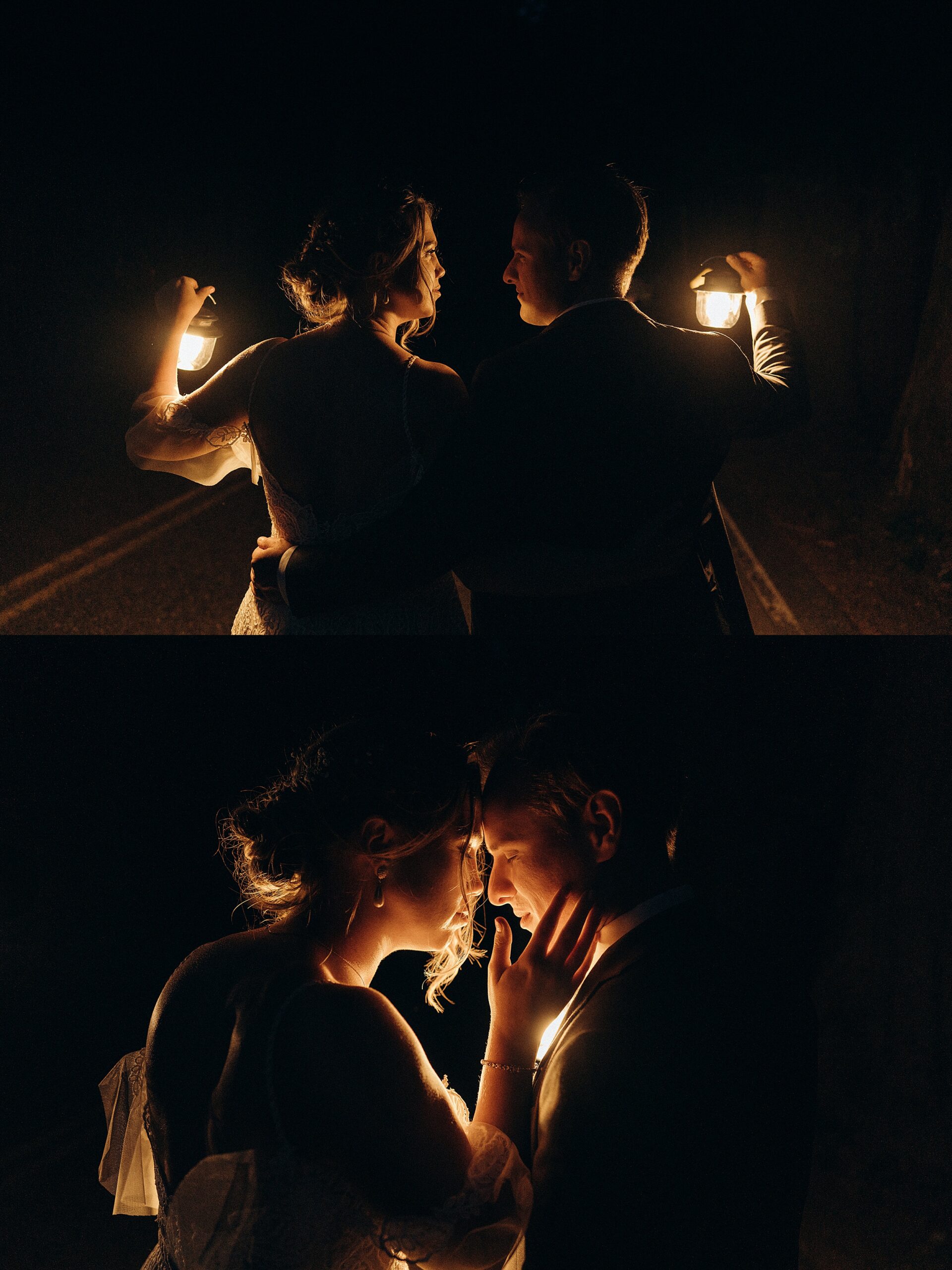
Best Software to Use for Elopement Photography
Finally, let’s move onto some of my favorite software & programs that I use in my elopement photography business, because your backend workflows are just as important as having great gear when it comes to creating an incredible client experience + lightening your own workload!
For culling: Photo Mechanic
Photo Mechanic is by far the best culling software for photographers. You can get through your images super quickly and can add a label or star rating to organize them! If you’ll be blogging an elopement, you can speed up the blogging process by adding a specific label/star rating to the photos you know you’ll want to use in the blog post.
CRM: Honeybook
Honeybook is the greatest all-in-one customer relationship management system (CRM) on the market, providing a billion different features that’ll make your workflows easy peasy. You can send your clients contracts, proposals, invoices, and questionnaires, keep track of your income, set up payment plans, create exclusive portals for your clients to access, and SO much more. If you want to try it out but aren’t sure you want to pay the full price yet, you can get a 7-day free trial plus 25% off your first year of Honeybook with my referral link!
Client galleries: Pixieset
Pixieset is my favorite program for creating beautiful client galleries, and letting your clients have the option to purchase prints, albums, favorite their photos, etc! It’s super user-friendly both for you on the backend & for your clients when they view their photos.
Slideshows & smart albums: Pixellu
I love delivering an above and beyond experience to my clients by not only delivering a beautiful gallery of images through Pixieset, but also creating a custom slideshow for them through Pixellu! You can also use Pixellu’s SmartAlbums system to easily design, proof, and print gorgeous albums for your clients.
Editing: Lightroom Classic and Photoshop
It should come as no surprise that I use Lightroom & Photoshop to edit my photos, being that those are the two most popular and powerful editing softwares on the market. I use Lightroom for basic edits and adjustments such as exposure, temperature, color grading, etc., and I use Photoshop for more complex edits such as smoothing out skin or removing large objects. Both programs have SO many features for photographers, and are constantly improving + adding more.
Quick editing: Lightroom CC Mobile
For on-the-go editing (e.g. if you want to edit a BTS iPhone photo and share it to your Instagram story before you can get to your computer), definitely download the Lightroom CC mobile app!
Image optimization: JPEGMini
The final step of your workflow before delivering galleries to your clients should be to run your images through an optimization/compression tool such as JPEGMini. This will compress your images and reduce their file size, without ruining the quality. It’s important to do this so that your clients don’t have to download massive images, and so that you’re not uploading huge files to your website + blog posts that could slow down page load speeds.
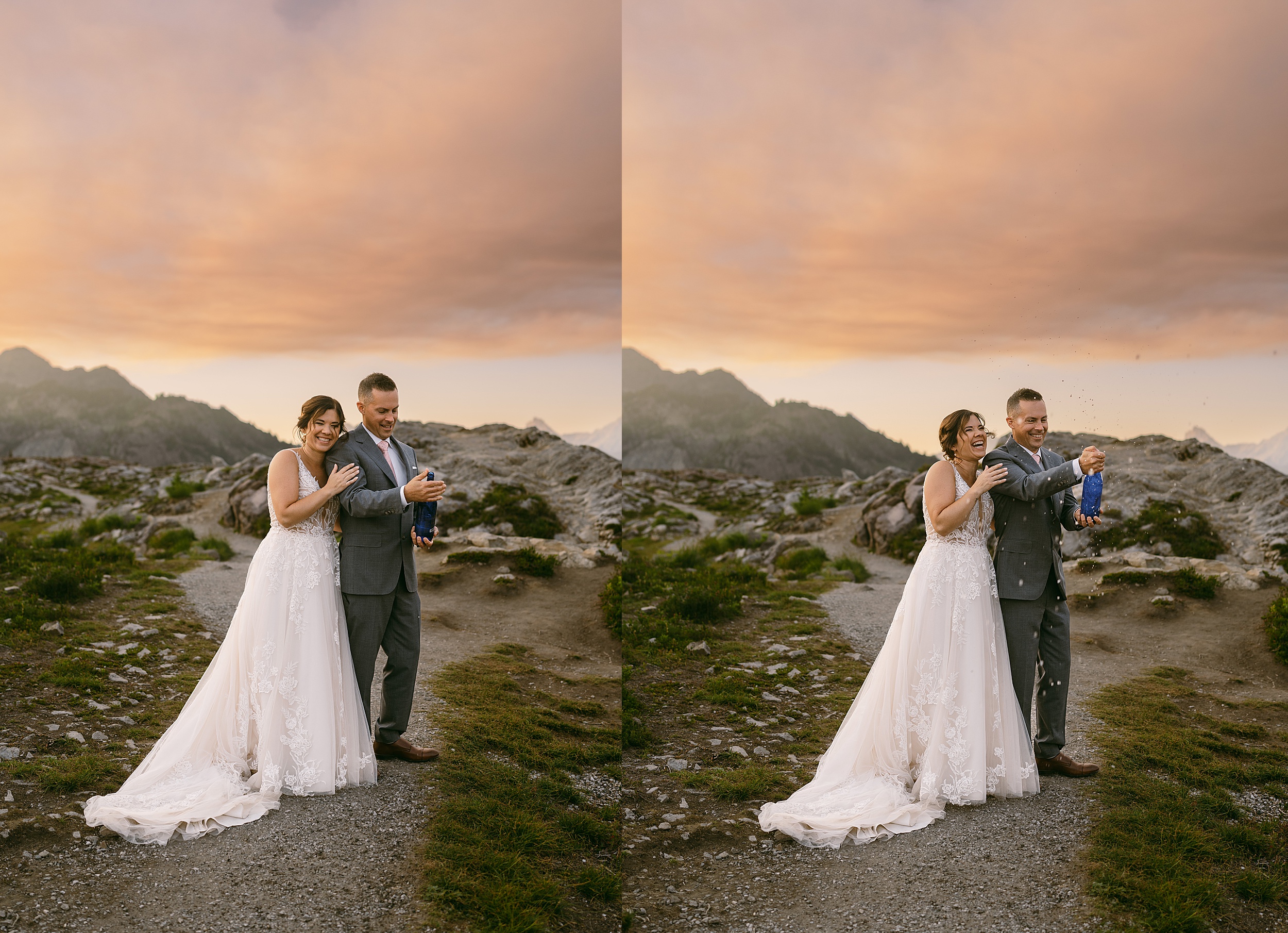
Growing Your Elopement Photography Business
Even though I just spent 3000 words giving you my personal recommendations for gear, accessories, and software, I do want to encourage you that new gear won't automatically make you a better photographer, but knowing how to use it WILL. Even if you can’t buy all the newest, most expensive equipment right away, having knowledge under your belt about how to make the most of the equipment you do have is key to creating beautiful images for your clients, and running a successful elopement photography business!
And if you want to run a successful elopement photography business, there’s a whole lot more that goes into it besides your gear: marketing, client experience, workflows, social media, systems. . . the list goes on and on. I believe that one of the best ways you can kickstart your elopement photography business and really get a leg up on others at your level is by having an excellent mentor! Being a photographer is a DREAM come true, and prioritizing your education will help make sure you can create a sustainable business that allows those dreams to prosper & give you the life you want to live.
As a seasoned elopement photographer, I’m here to help you understand and harness your unique gifts, and give you all the tools you need to create not only a successful business, but a fulfilling one, too! I offer a variety of different mentorships for elopement photographers, from 1:1 personal workshops to quarterly Zoom mentorships. Learn all about what I offer & get more free education here, and then fill out my contact form when you’re ready to jump in & start learning! I can’t wait to be by your side every step of the way!
PIN FOR LATER
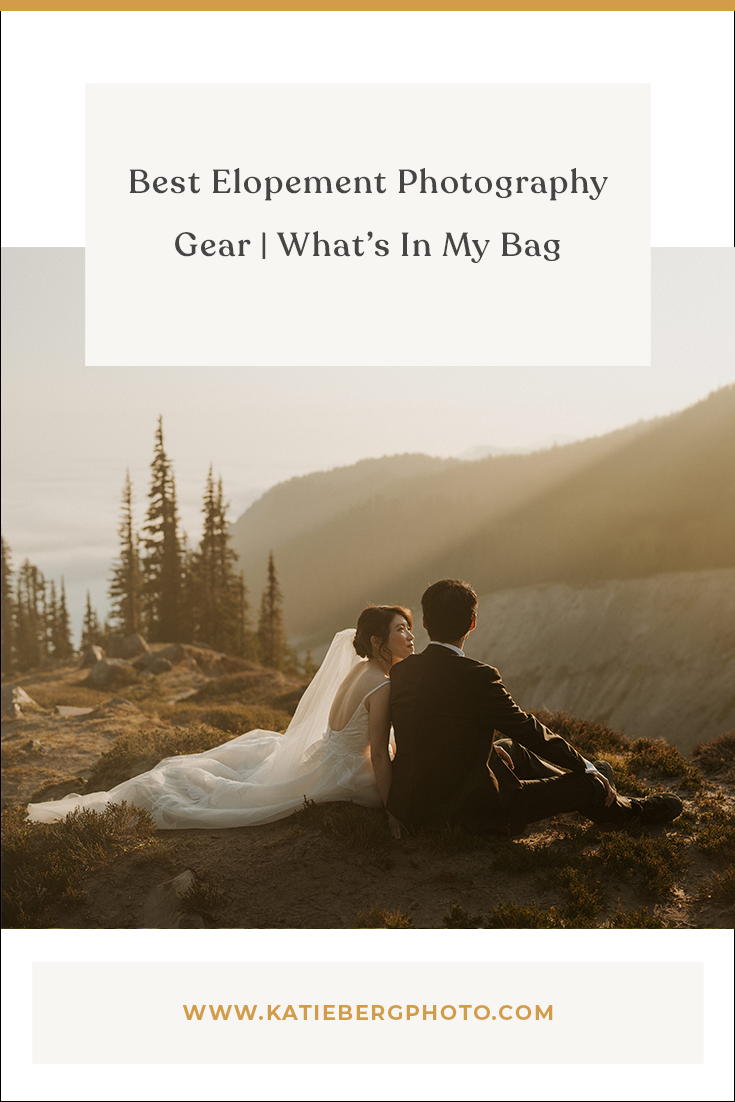
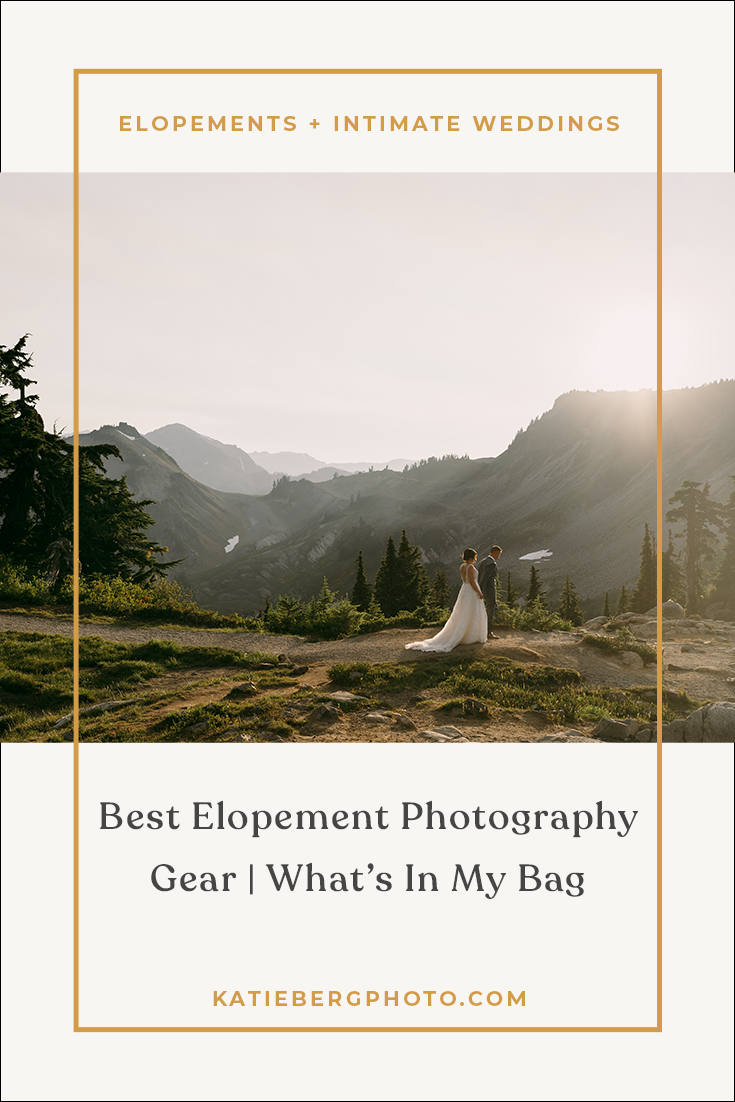
Looking for more free resources to help you find success as an elopement photographer? Here’s where to start:
How to Become an Adventure Elopement Photographer
8 Self Care Tips for the Creative Entrepreneur
3 Must-Have Clauses in Your Elopement Photography Contract

In order to make your dream elopement day happen, it's super important that we connect and that you feel comfortable with me! The best way to do this is to reach out and schedule a call so you can learn more about me and I can learn about you two so i can document what's real + the most important to you.


